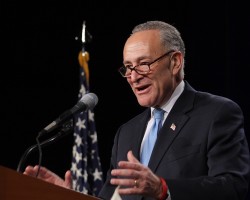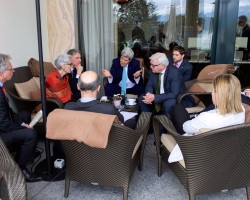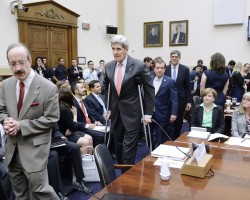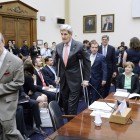
Sen. Schumer’s Partial Endorsement of the Iran Deal
Sen. Schumer’s partial endorsement of the Iran deal
By John Bradshaw, Executive Director of NSN
August 7, 2015
Chuck Schumer’s announcement that he will vote to disapprove the Iran deal was not unexpected, but his detailed explanation of his decision contains some surprisingly positive analysis of the agreement. After citing a number of weaknesses he sees in the first ten years of the deal, Schumer admits that: “Those who argue for the agreement say it is better to have an imperfect deal than to have nothing; that without the agreement, there would be no inspections, no snapback. When you consider only this portion of the deal — nuclear restrictions for the first ten years — that line of thinking is plausible”.
Not a ringing endorsement, to be sure, but Schumer is conceding here that the provisions of the deal – inspections, snapback – are not so bad that they would in themselves justify rejecting the deal. Senators looking to Sen. Schumer for guidance on how to approach their vote should accept his conclusion that the nuclear restrictions are at least “plausible” and look at his stated reasons for opposing the deal. The Senator bases his decision to vote no not on inadequate restrictions but largely on what he thinks would happen after some of the restrictions of the agreement on Iran’s civilian nuclear program began to be lifted. He contends that “the agreement would allow Iran, after ten to fifteen years, to be a nuclear threshold state with the blessing of the world community.” Of course, Iran, essentially a threshold nuclear state today, will not be allowed to build nuclear weapons after ten of fifteen years and no “blessing” of their civilian program will make it permissible for them to do so. The Senator is right, though, that no one can predict what Iranian behavior will be in 10 or 15 years and support for a deal should not be based on any hoped for Iranian regime moderation by that time. He concludes that, “the very real risk that Iran will not moderate and will, instead, use the agreement to pursue its nefarious goals is too great.” The logic here is curious: The agreement is ok for 10 to 15 years but after that bad things may happen so we need to reject the deal now.
The only way this makes any sense is if we can get – you guessed it – a “better deal.” After all the careful analysis and weighing of pros and cons Sen. Schumer comes out right where all the anti-deal hardliners have stood for many months: In favor of the better deal. The Senator believes we will get this better deal if we, “keep U.S. sanctions in place, strengthen them, enforce secondary sanctions on other nations, and pursue the hard-trodden path of diplomacy once more, difficult as it may be.” For those members of Congress who are following Schumer’s analysis the critical question becomes: Is this path “plausible”? Will the U.S. be able politically to strengthen sanctions, enforce secondary sanctions without major costs to our own economy, and get our international partners and Iran to come back to the negotiating table to work out a new longer term agreement? If that approach is not a complete fantasy then maybe Sen. Schumer’s analysis makes sense.
Otherwise, since the first 10-15 years of “plausible” restrictions is the best can be achieved, Senators should buy into Schumer’s partial endorsement of the deal, reject his fantasy solution, and vote to support the deal.






